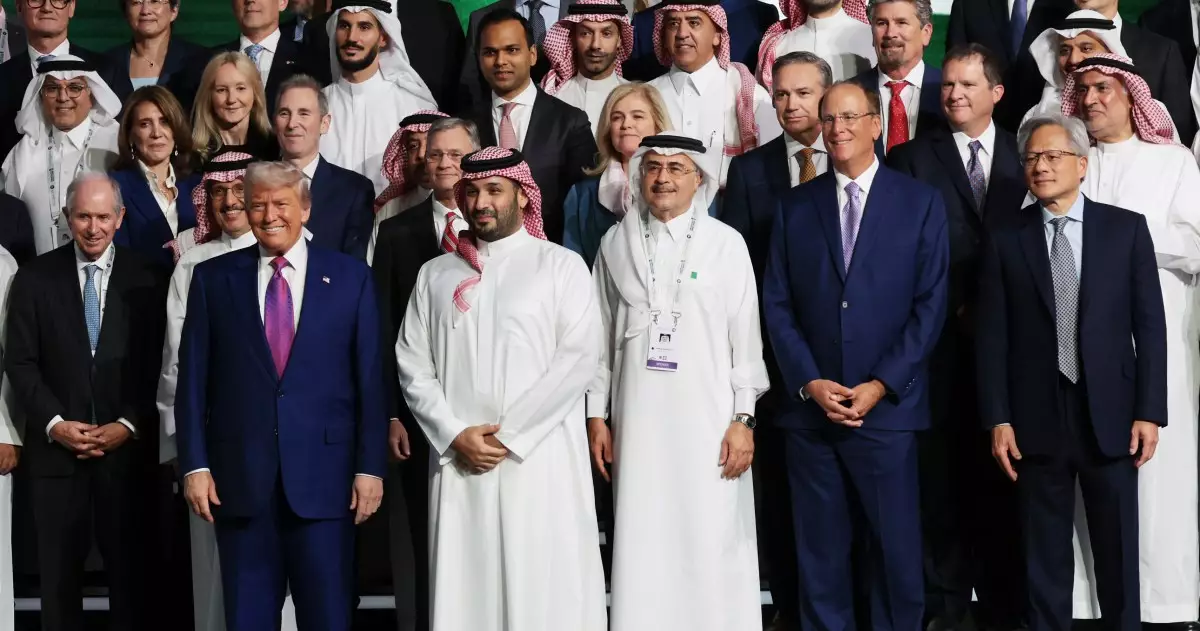In a rapidly evolving tech landscape, the dominance of Nvidia in the realm of artificial intelligence (AI) chips has been both impressive and contentious. The company has recently made headlines for its strategic engagements with political players that have seemingly eliminated obstacles threatening its market supremacy. Nvidia’s CEO Jensen Huang has notably cultivated relationships that align the company’s interests with those of the U.S. government, exemplified by recent trips to Saudi Arabia to promote investments in AI technologies. This partnership is not merely a matter of geopolitics but reflects a calculated move to secure Nvidia’s market position amidst increasing global competition.
Not long ago, the U.S. Department of Commerce announced a pivotal reversal regarding export limits on AI chips. This lifting of restrictions, previously steered towards safeguarding American technology from foreign appropriation, is now seen as beneficial to Nvidia, which commands an astonishing 90% market share in AI chips. The former Biden administration had instituted the Artificial Intelligence Diffusion Rule, aiming to regulate the distribution of U.S. chips abroad, a policy now seen as a potential threat to the national leader in AI technology.
Rather than succumbing to the burdens of regulations intended to prohibit adversaries like China and Russia from accessing cutting-edge tech, Nvidia’s lobbyists and strategic maneuvers have effectively altered the regulatory landscape, bolstering the company’s scope for innovation and expansion.
China’s Rise and the Threat of Huawei
Nvidia’s market position is further complicated by the emergence of competitors like Huawei, which is poised to challenge Nvidia’s hegemony through its own AI chip innovations. The U.S. government has taken a firm stance against Huawei’s Ascend AI chipset, framing it as a significant contender to Nvidia’s offerings. The Department of Commerce has now issued warnings that using Huawei’s technologically advanced components could jeopardize compliance with U.S. export control agreements.
This is emblematic of a deeper tension in the tech industry. While the U.S. administration touts the need for American leadership in AI, it also faces a parallel reality where other nations are developing their own sophisticated alternative technologies. Huawei’s aggressive investments in homegrown chip developments represent not only a challenge to Nvidia but also a question of how long the U.S. can maintain its position without facing amplified international competition.
In attempting to cordon off these advancements with restrictions and policy maneuvers, the government risks stifling overall innovation, potentially driving progress underground or outside its jurisdiction altogether. The so-called “competition” could morph into an arms race where technological advancements might not necessarily align with U.S. interests.
The Reversal of the AI Diffusion Rule
The rescinding of the Artificial Intelligence Diffusion Rule represents a significant shift in policy, one that the Department of Commerce argues will foster innovation rather than inhibit it. By dismantling regulatory barriers, the U.S. government is ostensibly opening the floodgates for American companies to export technology without cumbersome approvals, thus enhancing competitiveness on the global stage. However, this move could also be viewed as a short-sighted tactic, prioritizing immediate gains while compromising long-term strategic objectives in the tech war with China.
While the lengths to which Nvidia has gone to ensure its dominance may be commendable from a business perspective, they mask broader implications for international relations and global technology governance. The administration’s swing back to enabling market freedoms showcases a willingness to prioritize corporate interests, often at the detriment of broader diplomatic ties.
Nvidia’s Future: A Balancing Act of Power and Responsibility
As Nvidia navigates this volatile landscape, it finds itself walking a tightrope between aggressive market expansion and the ethical responsibilities that come with technological innovation. The need for a robust ethical framework in AI deployment cannot be overstated. The dazzling prospects of AI technology inevitably raise concerns about privacy, security, and sociocultural impacts. Amid potential global monopolization, how Nvidia chooses to lead could determine the future trajectory of AI as a field, steering it toward either democratization or oligopolization.
Jensen Huang’s foray into international market dynamics, particularly in meetings involving world leaders, may signal more than just a corporate agenda—it represents an awakening to the intricate interplay between business and diplomacy. As the playing field of AI continues to expand, how Nvidia positions itself alongside competitors and regulatory frameworks will shape the future landscape of technology, innovation, and global cooperation.


Leave a Reply